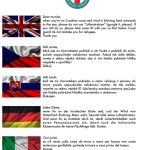July 9, 2023 – Chris Smoje continues his look at aspects of the service industry in Croatia. “Čekaj”
As I write the post for week five, we have entered the high peak of the tourist season in Croatia. While summer and the “high” season runs for a few months, the forty days between the start of July and the middle of August are when things really ramp up. It’s great to be able to look at service transition into this ultra-peak time to get a glimpse into how service changes based on the season.
While Croatia definitely has its distinct tourist seasons, it’s interesting to see that Croatia is no different to everywhere else in the world that I’ve been to, including my home country Australia in terms of the topic of this article.
In keeping with the theme of the previous articles in this series, my thinking and inspiration about this topic come from some of the words that my Baba and Dida used when I was a child. Every Croatian child would have grown up hearing these words, which can enable us to gain a glimpse into the mentality of their culture.
When my own children want something, they usually want it immediately. They ask for things always at a time that’s inconvenient or when something more important is pressing. They don’t know it’s poor timing and they certainly haven’t learnt to wait. When we would do the same as kids my grandparents used to say “Čekaj” which means to wait.
As I said at the beginning, the relationship between customer service and patience is no more relevant in Croatia than it is in Australia. But having said that, I’ve never heard it spoken about more than it is here.
When making small talk with a friend or a neighbour, asking about what you have planned for the day usually segues into the topic of queues and crowds. These are known as “gužva”. And why wouldn’t it, when the country has an influx of tourists by road, air, and sea, not to mention the domestic tourists and the residents. Even on the radio, the traffic report before the news always begins with a traffic update and specifically reports on the wait times at the popular border crossings.
But, when it comes to processing the “gužva”, you simply need to “Čekaj”!
Short staffing seems to be a problem everywhere at the moment, and it’s no different in Croatia. What is interesting to observe in public offices and even supermarkets, there’s a distinct line between the person serving a customer and other staff members. It would make sense for a colleague to jump onto an available counter to ‘clear the backlog’ of customers, but that doesn’t really happen here. If there’s one person serving, then there is one person serving.
I’m not sure whether that is because of job role (including lack of training, or having so much other work to do), or perhaps a combination of that and not wanting to help out other colleagues – I’m not sure, and I haven’t asked.
Regardless, Croatians all know that if they don’t get to a place early to beat the queues – they’ll be in for a wait, and if you’re travelling to Croatia during this peak season, it is a good idea to prepare yourself to wait.
What I have found in terms of my own observations and in talking to people, aside from the staffing, when it comes to queues and waiting, there’s not an awful lot done to make things quicker.
One of the first articles I wrote was about the pace of service in general, but what I have found is there are little things that Croatians do that keep queues and wait times as they are.
Some of the most obvious things are having the right change and getting a printed receipt. No matter how long the queue is, handing a €20 note over for a €6 purchase will definitely result in a “discussion” around having the correct change so all of the coins from the register aren’t depleted. Making sure you get your receipt, even for a €6 purchase will need to happen, even if there’s a problem printing it.
Croatians themselves have told me that Croatians don’t mind having a bit of ‘red tape’. These small little things that don’t seem big – or a quite trivial for that matter, do take time away from service. All the more reason to either avoid the “gužva”, or simply “Čekaj”.
It got me thinking, especially with my family – whenever someone told me to wait, I didn’t feel a sense of speeding up. If baba said “Čekaj”, you would know you’d be waiting until she finished doing what she was doing.
In all of my articles in the series, I’ve always taken a positive look on every service experience. These aim to show insight and understanding around other service cultures, and are in no way a criticism. So, it got me thinking about long queues and patience – what are the positives?
Overall, you could say that it doesn’t seem that many corners are cut in Croatia (I’m not talking about cutting corners in terms of quality of product). In other words, if everything is done you wouldn’t overly expect there to be errors, but also the service you get would always be consistent. It’s worth highlighting that in my experience, inconsistency and rework are often things customers cite as big turnoffs. So, you could say that the service in Croatia takes things to the opposite extreme.
And, while the Croatians are happy to “Čekaj”, now is a good time to start teaching my toddler and baby to be patient and wait!
Chris Smoje is an Australian-Croatian expert educator and thought leader on customer service cultures. He is an Amazon best-selling author for his book “All-In Culture: Lead your people to be of service” and is a professional speaker delivering his programs to organisations and conferences globally. www.chrissmoje.com
Previously from Chris: Polako – the Art of Service: Slowing Down, Pazi! Croatian Service Awareness, Pamet – Croatian Service and Sensibility, and Bjezi – When Service Comes to an End.










